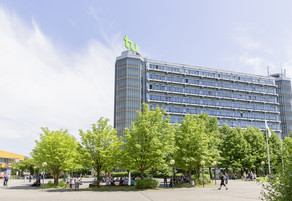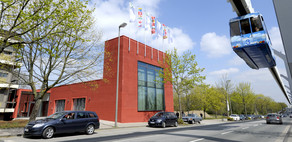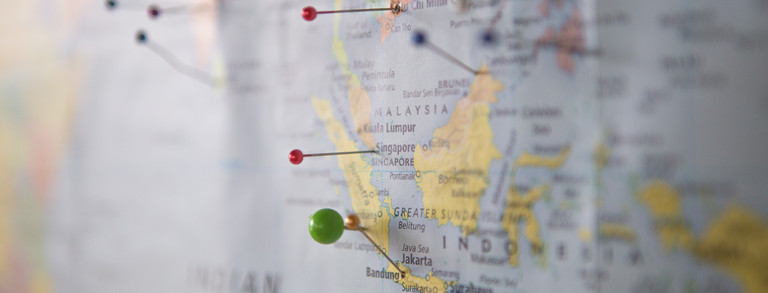Erasmus+ Staff Mobility (Incomings)
Your willingness to host a colleague from another European country as part of an Erasmus+ staff mobility in your department makes a valuable contribution to the internationalization of university administration.
Work shadowing offers the opportunity to immerse colleagues from other European universities in your own working day. This exchange has many advantages:
- Fresh perspective on established processes: External observers often see work processes from a new perspective and can provide valuable suggestions.
- Knowledge transfer: By sharing best practices, both sides benefit from new ideas and solutions.
- Network expansion: Work shadowing strengthens networking and promotes long-term, international cooperation.
- Personal and professional development: The insight into other work contexts supports personal reflection and further development.
In the Erasmus+ program, an Erasmus+ Inter-Institutional Agreement (IIA) is required for the exchange of teaching staff. In order to host administrative staff, such an IIA between the person's home university and TU Dortmund University is not required. These mobilities can therefore take place completely separately from Erasmus+ student and teaching staff mobilities.
However, it is of interest to know whether the person interested in work shadowing comes from a partner university to spend time at TU Dortmund University as part of an Erasmus+ staff mobility. In this way, it is possible to determine whether TU Dortmund University already maintains a relationship with this university at other levels (e.g. student and/or teaching staff mobility).
This information can be found on the following websites:
The conditions for Erasmus+ staff mobility are the same for all universities with a valid European Policy Statement and the Erasmus Charter for Higher Education (2020) awarded by the EU Commission.
The answers to the questions
- Who can apply?
- Which countries can I apply for?
- In this context, Germany is of course the target country and the countries mentioned therefore refer to the countries of origin of the interested parties.
- What are the goals?
can be found on the Erasmus+ staff mobility homepage and apply to both outgoing and incoming staff.
However, each university in a program country may give different answers to the following questions, as the distribution of funds may vary and the administrative steps on the home university side may also differ from those at TU Dortmund University:
- Duration of funding
- This is determined by the home university.
- How high are the financial benefits?
- The mobility grant also depends on the Erasmus+ budget of the home university that is financing the trip.
- It is important to know that the sending university is always responsible for the administrative and financial processing. This means that your department will not be responsible for the guest's travel and/or accommodation costs.
- How can I apply?
- You always apply for the Erasmus+ mobility grant at your home university.
- What administrative steps must be followed for the grant?
- These are also determined by the home university for its respective outgoing staff. However, there is no entitlement to funding.
- However, an Erasmus+ Mobility Agreement must be completed by all participants in the Erasmus+ program. The participant will fill out the template provided by the EU Commission and send it to you. It can be signed by the supervising person in the department. After completion, please send a scan of the Mobility Agreement to the International Office (Andrea Schöne). This gives the International Office an overview of guests who are received by administrative institutions or departments as part of the Erasmus+ program so that information for statistical queries can be provided.
Preparation
Guests are responsible for their own preparation. However, your department may choose to provide support, in particular with
- Applying for a visa (if necessary) (the Federal Foreign Office can provide helpful information here)
- Finding accommodation (hotels near the university are a good option, as the stay is usually only a few days)
- Finding suitable childcare (the TU Dortmund University Family Service can help here)
- Necessary support with disabilities ( DoBuS can help here)
- Planning the journey
A letter of invitation is often required as proof when applying for a visa or funding. You must provide this letter. The International Office will be happy to help you prepare such a document.
Of course, the content of the work shadowing must be agreed in advance at departmental level.
Arrival
Upon arrival, you are responsible for welcoming the guests and familiarizing them with their temporary workplace.
Your colleague will certainly have to sign a document at TU Dortmund University that commits them to confidentiality and compliance with data protection. You will receive more detailed information here shortly.
It is up to the departments themselves to decide to what extent they will accompany the guest after the official working hours at TU Dortmund University. As a rule, guests should be looked after in the same way as you would like to be looked after at a host organization. A return visit, i.e. an Erasmus+ staff mobility of a TU Dortmund University employee at the host university, is certainly already being planned.
Departure
Guests are responsible for preparing their departure.
Guests require a signature on their Certificate of Attendance, which they can sign in the department.



![Eat & Read [Translate to English:]](/storages/international/r/Bilder/Veranstaltungen/Eat___Read/waffel_plain_buecherturm.jpg)









